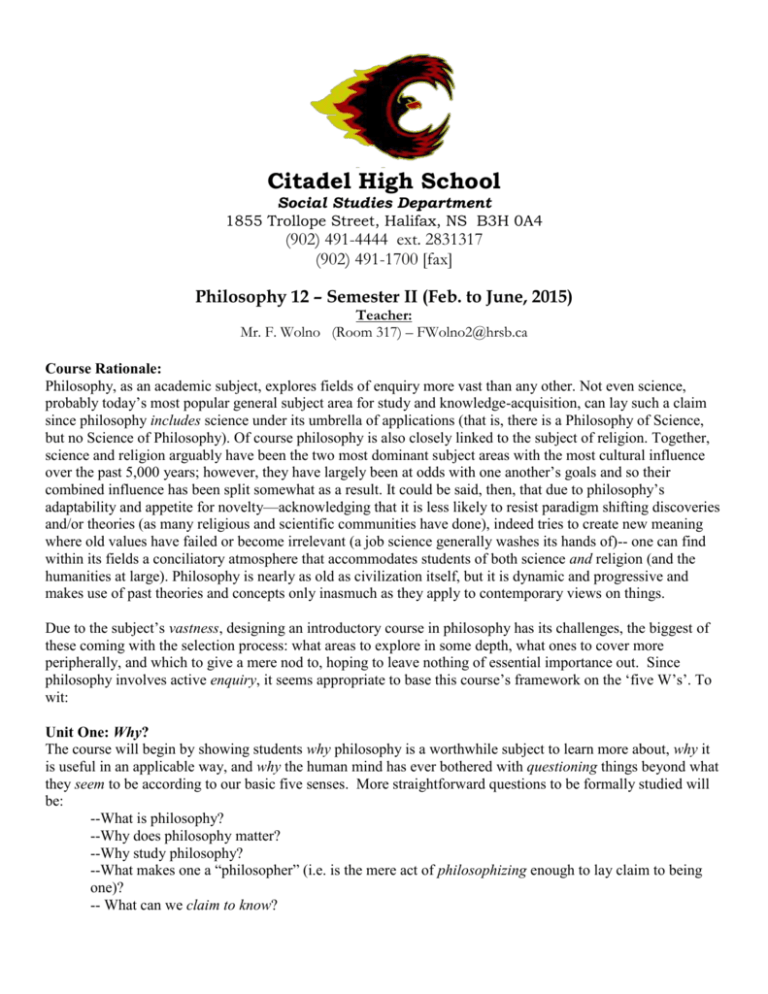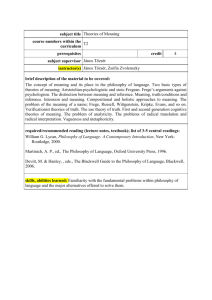Philosophy 12: Course Outline
advertisement

Citadel High School Social Studies Department 1855 Trollope Street, Halifax, NS B3H 0A4 (902) 491-4444 ext. 2831317 (902) 491-1700 [fax] Philosophy 12 – Semester II (Feb. to June, 2015) Teacher: Mr. F. Wolno (Room 317) – FWolno2@hrsb.ca Course Rationale: Philosophy, as an academic subject, explores fields of enquiry more vast than any other. Not even science, probably today’s most popular general subject area for study and knowledge-acquisition, can lay such a claim since philosophy includes science under its umbrella of applications (that is, there is a Philosophy of Science, but no Science of Philosophy). Of course philosophy is also closely linked to the subject of religion. Together, science and religion arguably have been the two most dominant subject areas with the most cultural influence over the past 5,000 years; however, they have largely been at odds with one another’s goals and so their combined influence has been split somewhat as a result. It could be said, then, that due to philosophy’s adaptability and appetite for novelty—acknowledging that it is less likely to resist paradigm shifting discoveries and/or theories (as many religious and scientific communities have done), indeed tries to create new meaning where old values have failed or become irrelevant (a job science generally washes its hands of)-- one can find within its fields a conciliatory atmosphere that accommodates students of both science and religion (and the humanities at large). Philosophy is nearly as old as civilization itself, but it is dynamic and progressive and makes use of past theories and concepts only inasmuch as they apply to contemporary views on things. Due to the subject’s vastness, designing an introductory course in philosophy has its challenges, the biggest of these coming with the selection process: what areas to explore in some depth, what ones to cover more peripherally, and which to give a mere nod to, hoping to leave nothing of essential importance out. Since philosophy involves active enquiry, it seems appropriate to base this course’s framework on the ‘five W’s’. To wit: Unit One: Why? The course will begin by showing students why philosophy is a worthwhile subject to learn more about, why it is useful in an applicable way, and why the human mind has ever bothered with questioning things beyond what they seem to be according to our basic five senses. More straightforward questions to be formally studied will be: --What is philosophy? --Why does philosophy matter? --Why study philosophy? --What makes one a “philosopher” (i.e. is the mere act of philosophizing enough to lay claim to being one)? -- What can we claim to know? Unit Two: When and Where? A retrospective survey will be conducted into the major philosophical movements that have taken place in the past. From Hebrew monotheism to Confucianism to Platonic thought in the ancient world to Phenomenology, Existentialism, and Semiotics in the modern, the core theories from various movements will be analyzed, as will be the influences of time (historical circumstances) and space (geographical circumstances) on these. Unit Three: What? After being introduced to past contributions and developments of philosophy, students will be introduced to the more widely accepted theories of today. What is the place of the individual in today’s world and what are the current cosmologies most frequently being referred to? Is Creationism an obsolete theory? Why have Darwinism and the “Big Bang” theories become more widely accepted with regard to the origins of the universe and humankind and why have others in this vein dwindled in influence? Also, what are the implications of the recently popularized “Intelligent Design” theory on this line of enquiry? By the end of this unit it is hoped that students will have a firm grasp on the more commonly held world-views of today. Unit Four: Who (and How)? Having substantiated the subject of philosophy by analyzing its general function and explored some of its specific applications (Units One and Two), then having put the individual student into a contemporary philosophical context (Unit Three), the time will have arrived to begin an exploration into the self. The Philosophy of Self (partly what is covered by ontology) uses all of the skills learned in order to enquire into external realities and turns these around for purposes of introspection. The thinker will look within to compose theories about who s/he is and how s/he may live a meaningful existence. When roughly translated, the Greek root words for ‘philo-sophy’ come out to “(a) love (of) wisdom”. Without question, a great deal of what philosophy focuses on is learning and knowing, but it is by doing these things in such a way that they become internalized and ever-active that a form of wisdom is attained-- the student of philosophy becomes a philosopher, if you will. Course Outcomes: The following are essential things that students should know and be able to do as a result of studying Philosophy 12: have a solid grasp of the ‘evolution’ of philosophical thought and its traditions in a historical/geographical insights/frameworks past and present understand the nature of knowledge, especially in relation to language, culture, and history develop a range of learning strategies that provide opportunities to become active members of a collaborative learning community reflect critically on knowledge and justifications for knowledge claims, and their own and others’ value positions and world-views to develop clarity in thinking and a healthy openness to new ideas identify relationships between philosophy and enduring universal and individual dilemmas express in writing and in speech philosophical theories as well as philosophize by using terminology germane to the particular area of philosophy being explored (varying levels of formality and specificity of terminology will be expected according to individual tasks)context Classroom Expectations: 1. 2. 3. 4. 5. Students are permitted to have water and/or juice beverages in the classroom. Ipods or MP3 players are not permitted in the Classroom. Cell Phones and Pagers are prohibited. No wearing of hoods in the classroom. As CHS is a Scent-Free Environment, please respect this policy while in the school and classroom. Student Responsibilities: 1. Since CHS is operating on a semester system, attendance in all classes is mandatory due to the large amount of work that needs to be covered in a shorter period of time. 2. Tardiness may also lead to academic hardships. Students are asked to be on time for class. Those showing up late should make minimal disruption when entering. 3. In cases of absenteeism, students are responsible to get caught up on all missed work. This should be done on the student’s own time. Students should take ownership in ensuring they complete any evaluation they missed through absenteeism. 4. All formal assignments passed in for evaluation are expected to be word-processed, following guidelines outlined in class, regarding proper presentation. 5. Any assignment which is found to be plagiarized in any capacity will be automatically assessed a mark of zero. Students will not be given the opportunity to make up an assignment assessed zero for plagiarism. While rules around plagiarism will be covered in class, students are encouraged to read the section on academic honesty in the student handbook on page 13. 6. All assignments are expected to be prepared for submission on an assigned date BEFORE class begins; a lot of unnecessary instruction time is lost when 30+ students are asking for staplers, sorting pages, etc. 7. Students must be punctual about meeting specific due dates. Curriculum outcomes may not be met if assignments are late or not passed in. 8. Late assignments will not be accepted if the rest of the class has already received the work back after being assessed by the teacher. 9. When a test or quiz is missed due to a valid excuse, the student should be prepared to write the test/quiz at lunch or after school the day of his/her return. Methods of Assessement and Evalutation: The final mark for this course will be arrived at according to the following: Written Expression: 25% (Based both on works studied as well as personal reflection; learning outcomes will be displayed by providing relevant, reflective, hypothetical and theoretical responses of varying length and formality of tone.) Quizzes/Tests: 20% (Based on works/theories studied; quizzes are intended to measure outcomes related to familiarity with basic concepts and terms of expression, as well as information sorting and deductive reasoning; tests will extend what quizzes do by adding tasks requiring critical thinking and interpretive insightfulness.) Oral Presentations: 20% (Based on research projects, one-per-term; outcomes to do with information gathering and sorting, connections between the subject and other, related subjects, including ‘lived experience’, critical thinking and topic-appropriate vocabulary will be assessed in conjunction with those outcomes related to personal reflection and clear expression.) Discussion/Interactive Learning: 5% (Based on concepts, related topics, historical and current issues; outcomes to do with active learning in small and whole group settings, along with speaking and listening skills and leadership ability will be gauged on an on-going basis) Exam: 30% (Based on a combination of knowledge-acquisition from works studied as well as thinking and writing skills developed over the course, outcomes will be evaluated according to a condensed but wide-ranging and balanced set of questions and tasks.) Total: 100%






